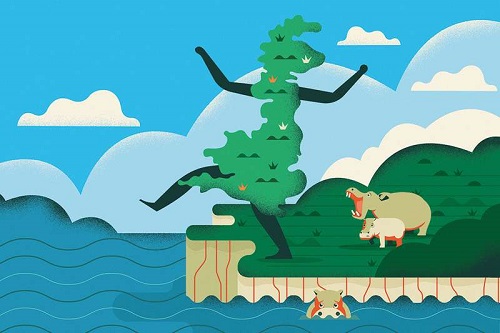
The first Brexit happened a very long time ago. According to Richard Webb in Brexit, 10,000 BC: The untold story of how Britain first left Europe (New Scientist), the white cliffs of Dover did not exist 450,000 years ago, just rolling hills. However, as usual, there was an ice age, and a glacial lake was formed in what is now the North Sea:
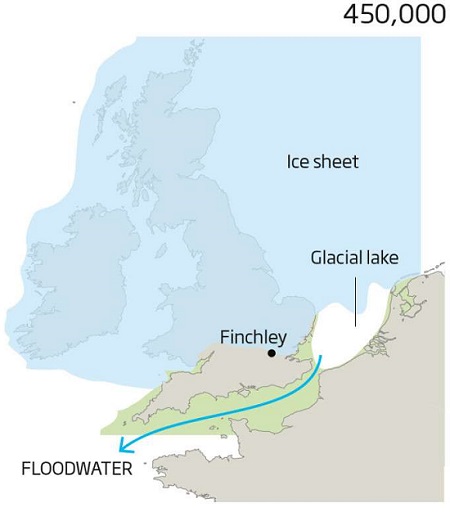
The lake was well above sea level to the southwest. The barrier, then made of bedrock, broke, and a volume of water similar to the present North Sea gushed through in a matter of two weeks, gouging out a large channel.
Subsequently during the ice ages which predominated and during the short interglacials Britain was still part of the continent of Europe.
Then 180,000 years ago, the same thing happened, although this time the barrier consisted of alluvial sediment rather than bedrock, so the lake did not grow to the same proportions before producing a gusher:
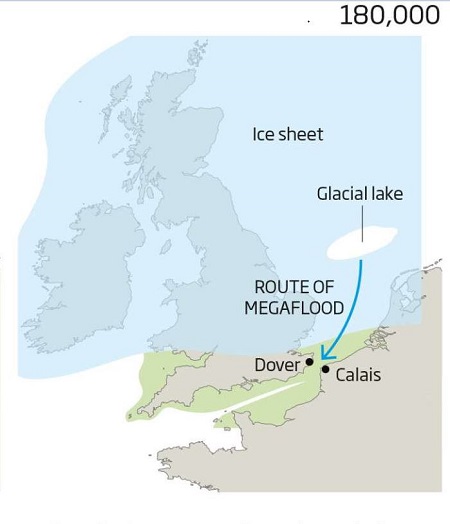
Ice ages then resumed which can lower the sea as much as 120 metres below today’s level, so most of the time you could have walked across with little difficulty until the Holocene, with the exception of the Eemian interglacial, when sea levels were 6-9 metres higher than now. So 125,000 years ago Britain was cut off in the first real Brexit. After the Eemian the ice sheet returned, and Britain was again attached to Europe. The Neanderthals who arrived about 60,000 years ago did not need a boat. Nor did Homo Sapiens who appeared around 40,000 years ago.
Between 20,000 years ago and 10,000 years ago, with the onset of the Holocene, there was serious warming and sea level rise but still Britain remained attached:
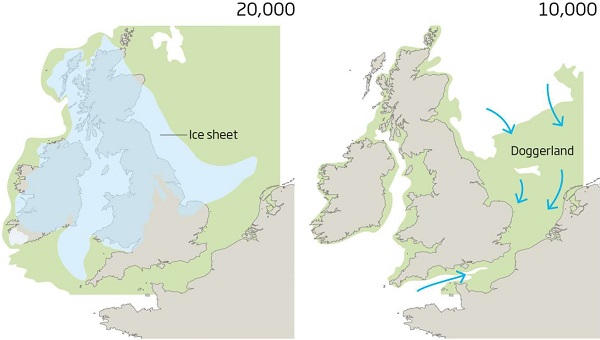
The final exit came with the ‘Norway solution’ around 8,200 years ago. Here’s the transition:
- By 9000 years ago, the world was considerably warmer and the sea was pushing its way back up through the Strait of Dover. To its north, there was still dry land. Known as Doggerland after the Dogger Bank, a sandy feature on the bottom of today’s North Sea, its pleasant, wooded valleys and meandering rivers would once have been a paradise for the stateless hunter-gatherers of the period. As the planet warmed further, the area became wetter and marshier, a low-lying lagoon archipelago.
The coup de grâce, 8200 years ago, was dramatic. An undersea earthquake triggered huge submarine landslides off the coast of Norway, known as the Storegga slides. They dislodged something like 3000 cubic kilometres of material, and created a huge tsunami that raced across the North Sea. Whatever was left of Doggerland didn’t stand a chance, overwhelmed by waves 5 metres high. Once again, the land bridge that connected Britain with Europe was washed away. For a third time, water rushed through the Strait of Dover – and Britain was left in glorious isolation again.
From then onwards, Britain has been free:
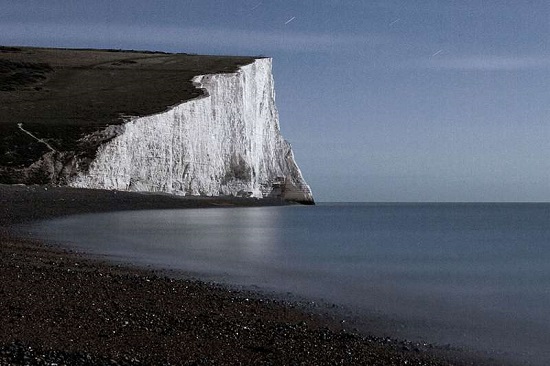
The above story is a simplification. The full story includes the reshaping of coastlines around the area. It does require verification and pinning down of the exact dates by a drilling program, which is expensive. Money had recently been secured, from the EU, but the project failed for want of a decent drilling boat. With economic and political Brexit, the project will be harder to revive.
As a related story, early hominins, possibly Homo antecessor, arrived in proto-Britain sometime before 800,000 years ago. Hominin footprints and stone tools have been found at Happisburgh, now on the Norfolk coast, some 200 kilometres north of Dover. These footprints are the oldest found outside Africa. The environment would have been harsh, but hominin presence persisted until 250,000 years ago.
As to the future, the greenhouse emissions caused modern Homo sapiens have ensured that the scheduled return to ice age conditions has been cancelled and Britain will remain forever free, and alone if it so chooses.

‘ere, wot’s this then?
you ‘avin’ a larff?
pullin’ our legs??
enuff trubble wiv yer REAL brexit, wivout some bleedin’ boffin come along tellin’ us abart glacial lakes ‘n’ summat. only glacials round ‘ere, mate, is the grimacin’ bleedin’ smiles on yon Theresa the May Pole. put ‘er up a May pole, no use fer anythin’ else. i mean we VOTED innit? we bleedin’ VOTED. wotwasthebleedinpointmate?
‘n’ that cameron geezer, shoulda ‘ad ‘is ‘ead read. reffobloodyrendum?
couldn’t sell apples in bleedin’ ‘igh street greengrocer, and they’re all poles mate up the off-licence, down the garage, over at bleedin’ …. don’t get me bloody started, and why’s bleedin’ FINCHLEY on the map, eh?
***didn’t bleedin’ exist***
is this some kinda re-run o’ The Goons?
you ‘avin’ a larff?
Missus says check the calendar. I did, it’s still 2019.
Wot she on abart???
“the project failed for want of a decent drilling boat”
Boaty McBoatface , your time has arrived!!
Indicative bleedin’ votes? you ‘avin’ me on?
Wot abart the Reffo Rendum???
No indicative votes in our arse when it’s comin’ up fer ‘olidays.
“No bleedin’ Eye-bitser this year,” I said.
“Belts need tightenin’. It’s Scarborough this year.”
Young ‘un mutters summat abart ‘carbon footprint’, I tell ‘im not to be disrespectful of ol’ Grandad who worked down pit; worked hard; better’n some young’uns I could name; so wot if ‘e left boots on ‘n left big black footprint on Axminster? Bitter scrubbin’, right as rain; elbow grease, etc.etc.
If we ‘ad indicative bloody votes on ‘oliday destination
we’d never get away.
Same as guvmint.
Wow! The massive flood down what became the English Channel, the Norwegian event that caused the tsunami that drowned Doggerland – and add to that the crash of the Atlantic through the Pillars of Hercules to form (or reform) the Mediterranean and later, the abrupt flooding of the plains that became the Black Sea. Who knows what geological disturbance north of Stavropol would send the waters of the Sea of Azov crashing through the Caspian Lowlands south east of Volgograd? (There was a shelved idea of doing a canal, by the peaceful use of nuclear bombs, way back in the Soviet era).
Gee, we live in a boring place. No active volcanoes in the pat 6 000 or so years; the last big change was the opening of Bass Strait, somewhere around 12 000 BC/BCE. Still, if we try really hard, we might have good fishing around Glasshouse Island and off the beaches of Hawksbury Gulf within a century or so.
Krakatau was fairly impressive, Graham, and not far away in distance or in time.
“May you live in dull, uninteresting times”
– Master Bland, Temple of the Nineteen Veils.
GM: A friend of mine had this to say about short term food supply. Couldn’t find anything on the web that was recent enough to have a bearing on this topic. Does your systems have anything similar to say?
Oops. You’re right Ambigulous. I did overlook the 27 August, 1884, eruption of Krakatoa, which killed around 40 000 in the resulting tsunami; the eruption was heard in Western Australia!
A pleasure to assist, Graham, with a little bulletin from Pedantry HQ, State of Victoria, state of bewilderment.
Selamat pagi!
Wonder if seiche waves played any part in the original Brexit?
https://www.abc.net.au/news/2019-04-04/a-seiche-wave-can-outpace-a-tsunami-meteorite-earthquake/10970306
Seiches are simply loverly.
Covered nicely in George Darwin’s book about tides. George was a descendant of Charles.
On a sufficiently wide lake (from memory, east-west orientation leads to a larger effect) the waves can be medium height.
For an estuary blocked off by the sand of the coast beach (at the usual mouth of the estuary) once a tiny breakthrough occurs, the release of estuary water cascades by scouring out a channel to the sea, and the opening is re-established.
I suppose you could call the start of that ‘a tipping point’.
So the right wave at the right moment might start the scouring and opening up…..
Onya Graham.